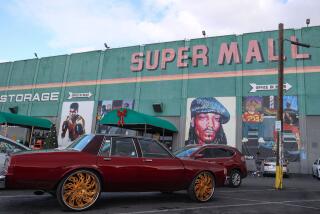On-Air Marts Trade on Rural Charm
PIKEVILLE, Ky. — Shawn Allen never knows what he’ll hear when he opens the phone lines.
As the host of “Trade Mart,” a popular call-in show at WXLR-FM in rural eastern Kentucky, he has helped people sell everything from billy goats to bass boats, fighting roosters to four-wheel-drives.
“I get a kick out of it,” Allen said one recent morning as he prepared to take the deluge of calls lighting up the switchboard. “Sometimes, I can’t help but laugh.”
Neither can the listeners who tune in throughout rural America for similar programs born decades ago, in the golden age of radio. Swap-shop programs, though fewer in number nowadays, continue to garner solid ratings.
The programs give people a chance to sell, trade or give away unneeded items or animals while allowing them to go on the air for a brief moment of fame.
The best shows are the ones people go to work talking about, like the time an old man called in advertising for a wife or when a woman called trying, without much success, to find someone to adopt a cat that had attacked her child, said Barry Boyd, general manager at WXLR in Harold, Ky.
Michael Biel, professor of radio and television at Morehead State University in Kentucky, said the programs have been dying out during the past 20 years as more radio stations opt for national programming piped in via satellite. He said he’s glad some stations are still hanging onto locally produced shows, like the swap-shop programs.
“As I’m traveling, I like listening to them because it gives me a flavor for the communities I’m driving through,” Biel said. “I don’t recall ever hearing anything like a swap shop until I moved out of the New York suburbs.”
One man who called Allen the other day needed a tailgate for his pickup truck. Another had fighting roosters for sale. About a dozen goats were advertised, as were a collection of Tennessee Ernie Ford and Elvis Presley records, two CB radios, several vehicles, two mobile homes, a treadle-type sewing machine and a George Foreman rotisserie grill.
“We get things like pocket watches, living-room suites, appliances, jewelry, saddles,” said Trish Stacy, who does a similar show, “Free Market,” for WSGS-FM in Hazard, Ky. “We get a lot of poultry and fowl. It’s definitely an interesting program. A lot of people just like to be on the radio. It’s their way of getting attention.”
One of Stacy’s favorite calls? The man who wanted to sell 722 boxes of Kraft deluxe macaroni and cheese. “Or I’d trade them for a good rooster.”
“It could have been a fake call,” Stacy said. “But you just never know.”
*
Many of the calls, she said, sound stranger than fiction, but, then, truth often is.
“People get up in the mornings and have their coffee to this show,” Stacy said. “It’s a very important part of their morning. It’s like their entertainment for the day. People are in amazement at all the things that are for sale.”
In rural areas that do not have local daily newspapers, radio fills the gap. Swap-shop programs are the on-air version of classified ads.
“I have to take a breather after the show,” Stacy said. “It can be that funny.”
More to Read
Sign up for The Wild
We’ll help you find the best places to hike, bike and run, as well as the perfect silent spots for meditation and yoga.
You may occasionally receive promotional content from the Los Angeles Times.






